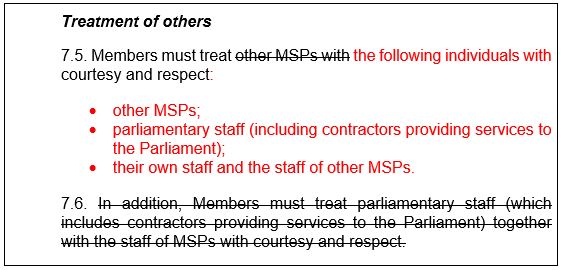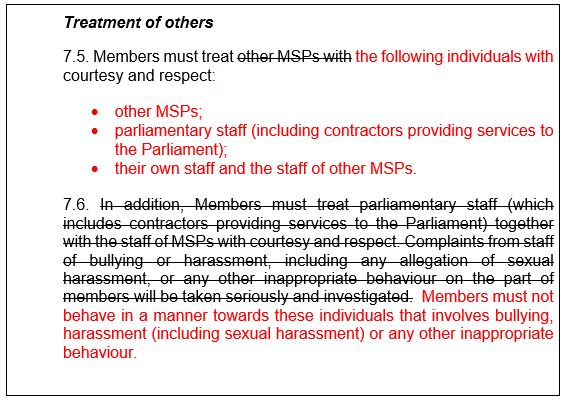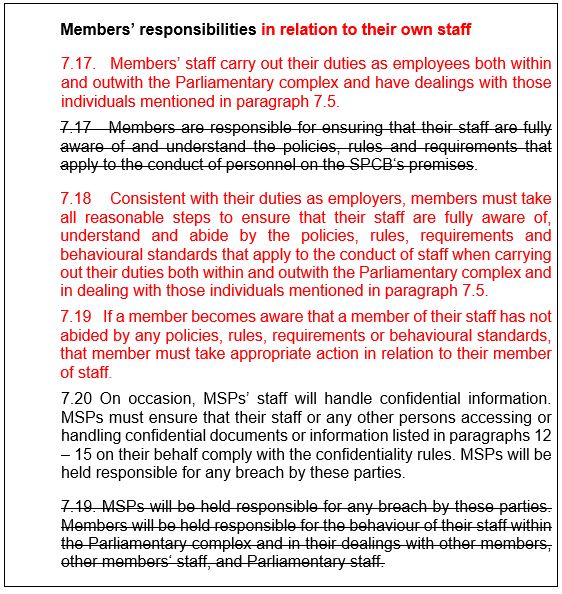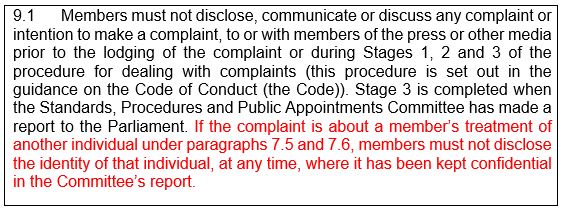Code of Conduct for MSPs - proposed revisions to implement the recommendations contained in the Joint Working Group's Report on Sexual Harassment and Sexist Behaviour
Introduction
The Parliament's Standing Orders provide for the Parliament to lay down a Code of Conduct (“the Code”) for MSPs. The Code contains some rules which emanate from statutory requirements and others which are non-statutory and were agreed by the Parliament to establish a comprehensive set of standards to which members must adhere.
In most cases, alleged breaches of the Code are investigated by the Commissioner for Ethical Standards in Public Life in Scotland. It is then the role of the Standards, Procedures and Public Appointments Committee (“the Committee”) to consider whether it agrees with the Commissioner’s findings and - if an MSP has breached the rules - whether to recommend a sanction to the Parliament.
It is also the role of the Committee to propose amendments to the Code and this report proposes revisions to the Code in order to implement the recommendations contained in the Joint Working Group’s Report on Sexual Harassment and Sexist Behaviour.
Background and consultation
The proposed revisions to the Code contained in this report represent the culmination of work which started in 2017 following press reports that there were issues to address in the Parliament in relation to sexual harassment.
Following the press reports, a survey was distributed to 1,600 people who worked in and for the Parliament, with 62% responding. The survey results indicated that while the majority of respondents (78%) had never experienced sexual harassment or sexist behaviour, a fifth had experienced such behaviour while working at the Parliament. When the results were broken down by sex, 30% of women and 6% of men reported experiencing sexual harassment or sexist behaviour.
The Committee initiated an inquiry in December 2017 into Sexual Harassment and Inappropriate Conduct. In in our inquiry report, we made a series of recommendations and highlighted a number of rules contained in the Code that we considered might need to be changed.
The Joint Working Group on Sexual Harassment and Sexist Behaviour (“the JWG”) was established in February 2018 to progress the work arising from the results of the staff survey on sexual harassment and sexist behaviour. It was composed of parliamentary officials, representatives from each political party and Emma Ritch, Director of Engender Scotland. The Joint Working Group’s remit was:
“To consider and agree any actions that need to be taken on a joint basis between the Parliament and political parties in light of the survey on sexual harassment and sexist behaviour.”i
The JWG report was published in December 2018 and, following a consultation on its recommendations, was referred to the Committee by the SPCB to take forward revisions to the Code of Conduct.
In the first half of 2019, the Committee considered the JWG’s recommendations and how the Code could be revised to implement them.
In June 2019, the Committee launched a three-month consultation of MSPs on the proposed revisions to the Code. The Committee considered the responses from MSPs, as well as from some MSP staff, and revised its proposals in light of their feedback. The following sections of this report explain the revisions proposed to the Code and Annexe A contains a full version of the proposed revisions.
Changes to the Code of Conduct
Excluded complaints
The JWG wanted to ensure that parliamentary staff, other members’ staff and members’ own staff could make a complaint directly to the Commissioner for Ethical Standards in Public Life (“the Commissioner”) about the behaviour of Members towards parliamentary staff and other members’ staff.
The JWG specifically recommended that section 9 of the Code of Conduct be revised to reflect the new sexual harassment policy and allow complaints to be made directly to the Commissioner about an MSP’s treatment of parliamentary staff or the staff of another member. The JWG report stated:
“As the Code is currently written, it does not take account of the variety of informal options that will be open to people under our policy and instead prescribes a particular route a complaint should take. Additionally, a complaint could only be referred to the SPPA committee once these additional steps have been taken and the decision is for the SPCB rather than the complainant themselves."
“Therefore, we believe that section 9 in relation to ‘Excluded Complaints’ needs to be rewritten to reflect the new policy and to allow complainants to take a formal complaint directly to the Commissioner without having gone through any other processes.”i
The Committee concluded in its report on Sexual Harassment and Inappropriate Conduct that it was inappropriate to pursue conciliation in cases of sexual harassment and that this provision should be revisited.
The Committee agrees with the emphasis placed by the JWG on trying to find informal approaches to resolve situations. The JWG stated, “The SPCB, the political parties and contractors will all be expected to engage with the Independent Support Service if they are approached to facilitate an informal resolution.”ii
The Committee also notes that the Parliament’s new Sexual Harassment Policy provides a series of informal routes which could be pursued, including contacting the recently established Independent Support Service for advice, speaking to a line manager, approaching the person directly or speaking to a Trade Union representative or colleague.
The Committee considers that a range of informal routes have been established and therefore recommends that section 9.6.d of the Code of Conduct on Excluded Complaints be taken out to allow complaints about Members’ treatment of parliamentary staff and other members’ staff to be made directly to the Commissioner. The proposed change is shown in the box below:

Treatment of others
Members' own staff
Unlike parliamentary staff and the staff of other MSPs, conduct matters arising within the employment relationship between a member and their own staff have, to date, been dealt with outside the Code of Conduct and under employment law. Section 7.6 of the Code applies to other groups within the Parliament, but not Members’ own staff. This means that complaints cannot currently be made under the Code of Conduct about Members’ treatment of their own staff. The current provision relating to the Treatment of Others in the Code states:
“7.6 In addition, Members must treat parliamentary staff (which includes contractors providing services to the Parliament) together with the staff of MSPs with courtesy and respect. Complaints from staff of bullying or harassment, including any allegation of sexual harassment, or any other inappropriate behaviour on the part of members will be taken seriously and investigated.”
The JWG was concerned that, in the case of any independent investigation, the employing Member would be responsible for determining whether they accepted the findings of that investigation and then deciding what action to take. The JWG therefore recommended that formal complaints should instead be dealt with under the Code of Conduct:
“While the Code of Conduct sets out the standard of behaviour expected of MSPs in their dealings with others, it does not specifically cover this in relation to Members’ treatment of their own staff. This means that any complaints from a member of staff against their employing member are dealt with under the relevant Grievance procedure."
“However, the process in the current Grievance procedure for member’s staff could lead to the report of an independent investigation being given to the employing Member who has been accused of harassment to determine whether they accepted the findings and to determine what action to take. This goes against the notion of a fair process and therefore, we think that such formal complaints should instead be dealt with under the Code of Conduct."
“This also means that the Parliament will be able to hold Members to account for their behaviour towards their own staff in the same way as their behaviour towards anyone else. We recognise, however, that this relationship is governed by employment legislation. This revised process allows for parliamentary sanctions to be imposed on the Member concerned but does not impinge on the complainant’s rights to seek other forms of redress, including taking a case to employment tribunal.”i
The Committee agrees that allowing complaints under the Code of Conduct about MSPs’ alleged treatment of their own staff to be made to the Ethical Standards Commissioner is consistent with its recommendation to take out Excluded Complaints and allow complaints to be made about Members’ treatment of parliamentary staff and other members’ staff directly to the Commissioner. The Committee considers that this would prevent a situation whereby there were different approaches for different groups of people working on the parliamentary estate.
The Committee is of the view that Members should be held to high standards of conduct as elected representatives under the Code. Furthermore, the Committee considers that Members should be held to a standard of conduct in relation to all of the key groups of individuals that Members came into contact with while undertaking their parliamentary duties, including their own staff.
The Committee considers that any complaint made under the Code about a Member’s behaviour would relate to the standards of conduct expected of them in their role as an MSP and would be separate from any action or grievance taken in the context of the employer-employee relationship.
The Committee therefore proposes that section 7.5 of the Code is revised to include a requirement on MSPs to treat “their own staff” with courtesy and respect.
The standard of conduct for the treatment of others
The current standard in the Code in relation to the treatment of others is set out under the broad term of “courtesy and respect”. In its report on Sexual Harassment and Inappropriate Conduct, the Committee stated that the text of the Code was “insufficiently detailed and could be redrafted”. Currently, Section 7.6 reads:
"Complaints from staff or bullying or harassment, including any allegation of sexual harassment, or any other inappropriate behaviour on the part of members will be taken seriously and investigated."
In addition, the Committee noted that there is no explicit standard in relation to sexual harassment, or any definitions of harassment or sexual harassment. The Committee also recognised that 9% of those who responded to the Sexual Harassment and Sexist Behaviour Survey considered that there was a “need for greater awareness/clarity about definitions of sexual harassment and sexist behaviour, and clear guidelines on this.”
The JWG also suggested that the Committee might wish to consider revising the standard in the Code to refer to bullying and inappropriate behaviour. The Joint Working Group stated that:
“when we review our procedures for dealing with bullying and other inappropriate conduct, it is likely that we will follow the same procedures as we are proposing for sexual harassment. Therefore, the SPPA committee might want to think about having a class of complaint that encompasses this broader range of misconduct.”i
In light of the JWG’s recommendation and the lack of clarity in the existing provision, the Committee is proposing a revision to the treatment of others section of the Code of Conduct in order to make it clear that Members must not behave in a manner towards others that includes bullying, harassment (including sexual harassment) or any other inappropriate behaviour:
If the Parliament agrees the changes to the Code, the Guidance on the Code of Conduct will be updated to provide definitions of bullying, harassment (including sexual harassment) and other inappropriate behaviour. The purpose of this is to provide clarity on the definitions of these terms.
Further extension of the Code to include other individuals
The Committee received a letter from the Minister for Parliamentary Business and Veterans in response to its consultation on the proposed changes to the Code of Conduct. In the letter, the Minister stated:
“I noted that the draft changes to paragraph 7.5 of the Members’ Code of Conduct set out some specific categories of individuals but do not reference Scottish Government staff (some of whom work in ministerial private office and many of whom otherwise regularly support Ministers or conduct official business bringing them into direct contact with MSPs). The Committee may therefore wish to consider extending the list in paragraph 7.5 to include civil servants.”i
In addition, Clare Adamson MSP proposed in her response to the consultation that MSPs should be expected to treat all visitors to the Parliament with courtesy and respect.
The Committee has agreed that it wishes to consider in more detail whether other individuals visiting or working in the Parliament – including Scottish Government staff – with whom Members come into contact in the course of their parliamentary duties, should also be included in section 7.5 of the Code of Conduct. The Committee has therefore agreed to initiate further work on potential changes to this section of the Code in late 2019 or early 2020.
Monitoring the effectiveness of the complaints process
The Committee heard concerns from MSPs that, as figures in public life, they might be vulnerable to complaints that were potentially malicious, vexatious or frivolous. While these complaints might later be proven to be unfounded, they could nevertheless attract considerable negative coverage, particularly on social media, leading to long-lasting reputational damage.
The Committee also recognises that the results from the staff survey showed that 20% of respondents had experienced sexual harassment or sexist behaviour. Furthermore, while knowledge of the reporting procedures was high, the numbers of those who had actually reported sexual harassment was low, with those who had experienced such behaviour being the least likely to have confidence in the reporting process. The Committee therefore considers that it is crucial that those who have experienced sexual harassment, particularly if they are a vulnerable person, have the confidence to come forward and make a complaint and feel that it will be dealt with fairly and confidentially under the complaints process. The Committee also recognises that investigations need to be conducted in private without the glare of publicity and with all parties respecting the confidentiality requirements.
The Committee believes that it is vital for the reputation of MSPs, as well as for the Scottish Parliament as a whole, that Members be held to high standards of conduct. Furthermore, the Committee considers that the independent investigative process that was established by the Scottish Parliamentary Standards Commissioner Act 2002 (the 2002 Act), and which is external to the Parliament, represents the most appropriate way to investigate any complaints in a manner which is just and fair for all parties involved.
The Committee discussed the existing investigation process, which is set out in detail in the 2002 Act, with the Ethical Standards Commissioner. This discussion provided clear evidence of the independence, objectivity and rigour of the investigation process. Nevertheless, in order to ensure that all parties can have faith in the process, the Committee agreed to monitor the complaints process, particularly in relation to the willingness of vulnerable people to bring complaints and the potential for unfounded complaints to be made against Members, as well ensuring investigations could be conducted in complete confidence without information appearing in the media.
Members responsibilities in relation to their own staff
Sections 7.17 and 7.18 of the Code of Conduct currently place a responsibility on members in relation to their own staff, with section 7.18 holding members responsible for the behaviour of their staff.
The Joint Working Group indicated that it did not consider that a formal complaint should be taken against a member where the complaint related to inappropriate behaviour by their staff. It stated:
“… neither do we think that a formal complaint of sexual harassment should be taken against a Member if it is their member of staff who is alleged to have behaved inappropriately. This is primarily because we want everyone to take responsibility for their own behaviour and while, in a ‘normal’ employment situation a manager should ensure staff are behaving appropriately, if a member of staff sexually harassed another member of staff it is they who would be disciplined and not their manager (unless the manager had been negligent in their duty in which case, a manager might be disciplined separately).”i
The Committee agreed that members should not be held responsible for the behaviour of their own staff in relation to inappropriate behaviour and instead considered that members must take all reasonable steps to ensure that their staff are fully aware of, understand and abide by the policies, rules, requirements and behavioural standards that apply to the conduct of staff when carrying out their duties both within and outwith the Parliamentary complex. In addition, the Committee agreed that members should be responsible for taking appropriate action in cases where their staff had behaved inappropriately.
The Committee received feedback from MSPs in response to its consultation on the extent to which MSPs should be answerable for the actions of a member of staff, particularly if they were unaware of those actions. In addition, MSPs sought clarifications on how the proposed changes sat with their responsibilities as employers.
The Committee therefore decided to further adjust the proposed revisions to this part of the Code to take account of the concerns of MSPs and clarify that the responsibilities of MSPs are consistent with their duties as employers. Thus, it is proposed that members are only responsible for taking appropriate action in relation to a member of staff where they are aware that that member of staff has not abided by any policies, rules, requirements or behavioural standards. The proposed revisions to the Code are set out in the box below:
Protection of identity of alleged victim
The JWG discussed the importance of confidentiality in the complaints process. It stated in its report—
“It is absolutely vital that there is confidentiality at the heart of any process we develop … both for the complainant and the respondent. Investigations must be allowed to progress without the glare of publicity.”i
When the Committee discussed this recommendation, it agreed that the Directions to the Commissioner should be revised:
To take out the Directions that allow the Commissioner to respond to enquiries as to whether a complaint concerning a member has been received.
To require the Commissioner to redact information which identified an alleged victim as far as possible and place a duty on the Commissioner not to include information which reveals the identity of any person (unless, in the view of the Commissioner there is a good reason for including this information).
The Committee also agreed that the non-disclosure requirements set out in the Code should be extended to require members not to disclose the identity of an individual who was the subject of a complaint against a member in relation to that member’s behaviour. This requirement is focused on the disclosure of the identity of the individual and would not stop the member from referring to the complaint after the Committee’s report had been published.
Right to make representations
The Joint Working Group on Sexual Harassment recommended that, where a person makes a complaint about sexual harassment, they should have new rights to make representations during the complaints process. The alleged victim should also be given the opportunity to comment on the Commissioner’s draft report. This would mirror the right given to the MSP and allow the alleged victim the chance to comment on the accuracy of the Commissioner’s report.
The Committee agreed that the Directions to the Commissioner should be revised to provide for a copy of the Commissioner’s draft report to be made available to the person who is alleged to have been treated by a Member in a way that breaches a relevant provision of the Code. It also gives the opportunity to that person to make representations on the alleged breach and the draft report.
Conclusion and Recommendation
The Code of Conduct revisions attached to this report have been proposed in order to implement the recommendations of the Joint Working Group on Sexual Harassment and Sexist Behaviour. MSPs have been consulted on the changes and the final proposed revisions respond to issues raised by them. The Committee believes that the proposed revisions will clarify the high standards of conduct expected of MSPs and provide for a fair and confidential process for any investigations carried out into breaches of the Code of Conduct for MSPs.
The Committee recommends that the Parliament agrees the changes to the Code of Conduct as set out in Annexe A.
Annexe A - Proposed Code of Conduct changes
Annexe B - Extract from minutes
2nd Meeting 2019 (Session 5), Thursday 31 January 2019
Sexual harassment and sexist behaviour (in private): The Committee considered its approach to the recommendations in the report from the Joint Working Group on sexual harassment and sexist behaviour.
3rd Meeting 2019 (Session 5), Thursday 28 February 2019
Sexual harassment and sexist behaviour (in private): The Committee considered the recommendations in the report from the Joint Working Group on sexual harassment and sexist behaviour.
4th Meeting 2019 (Session 5), Thursday 14 March 2019
Sexual harassment and sexist behaviour (in private): The Committee considered the recommendations in the report from the Joint Working Group on sexual harassment and sexist behaviour.
5th Meeting 2019 (Session 5), Thursday 28 March 2019
Sexual harassment and sexist behaviour (in private): The Committee considered the recommendations in the report from the Joint Working Group on sexual harassment and sexist behaviour.
7th Meeting 2019 (Session 5), Thursday 2 May 2019
Sexual harassment and sexist behaviour (in private): The Committee considered the recommendations in the report from the Joint Working Group on sexual harassment and sexist behaviour.
9th Meeting 2019 (Session 5), Thursday 30 May 2019
Sexual harassment and sexist behaviour (in private): The Committee considered the recommendations in the report from the Joint Working Group on sexual harassment and sexist behaviour.
10th Meeting 2019 (Session 5), Thursday 6 June 2019
Sexual harassment and sexist behaviour (in private): The Committee considered the recommendations in the report from the Joint Working Group on sexual harassment and sexist behaviour.
15th Meeting 2019 (Session 5), Thursday 26 September 2019
Sexual harassment and sexist behaviour (in private): The Committee considered proposed changes to the Code of Conduct.
16th Meeting 2019 (Session 5), Thursday 3 October 2019
Sexual harassment and sexist behaviour (in private): The Committee considered proposed changes to the Code of Conduct.
21st Meeting 2019 (Session 5), Thursday 21 November 2019
Sexual harassment and sexist behaviour (in private): The Committee considered revisions to the guidance on the Code of Conduct.
Sexual harassment and sexist behaviour (in private): The Committee considered revisions to the Direction to the Commissioner for Ethical Standards in Public Life in Scotland.
22nd Meeting 2019 (Session 5), Thursday 28 November 2019
Sexual harassment and sexist behaviour (in private): The Committee agreed a draft report and draft rule changes



